Chief Minister Arvind Kejriwal has been remanded to the custody of the Central Bureau of Investigation (CBI) for a period of three days by a Delhi court on Wednesday. This decision was made shortly after his arrest by the agency in relation to the Delhi excise policy case. Special judge Amitabh Rawat stated that Kejriwal’s custody was necessary due to the investigation’s findings, his alleged role in the case, and the need to confront him with the evidence. Additionally, the judge advised the agency to exercise caution and avoid excessive enthusiasm.
Although the court did not declare the arrest as illegal, it acknowledged that the timing of the action could have been more carefully considered. However, the timing alone cannot be the sole basis for deeming the arrest unlawful.
This is the account of the events that unfolded during the hearing of Arvind Kejriwal:
- The judge emphasized that the investigation falls under the jurisdiction of the CBI, with specific legal protections in place. Relying on the evidence presented, the judge deemed the arrest not unlawful at this point in the proceedings. However, the judge cautioned against the agency being overly aggressive.
- The judge directed the authorities to conduct a medical examination on Kejriwal and permit him to have daily meetings with his wife and lawyer.
- The CBI’s actions followed the Delhi high court’s decision to suspend the bail granted to the AAP leader by the lower court.
- According to the CBI, Kejriwal allegedly solicited financial support for the Aam Aadmi Party (AAP) from the former YSRCP Lok Sabha MP, Magunta Srinivasulu Reddy, while promising assistance for the liquor industry in the national capital.
- Arvind Kejriwal has been identified as one of the key figures involved in the illicit activities related to the excise policy for 2021-22 that has now been discarded.
- The Central Bureau of Investigation (CBI) stated that Vijay Nair, a former media in-charge of AAP and a close aide of Kejriwal, had been in contact with various liquor manufacturers and traders since March 2021, seeking unlawful favors in exchange for incorporating provisions beneficial to them in the upcoming Delhi excise policy.
- The CBI also alleged that AAP received kickbacks amounting to ₹100 crore, with ₹44.45 crore being diverted towards the Goa election campaign. Kejriwal, however, denied any wrongdoing and accused the CBI of sensationalizing the issue.
- He refuted claims that he had made any statement incriminating Manish Sisodia, the former Delhi deputy chief minister, or anyone else, emphasizing that both Sisodia and the AAP were innocent.
- Kejriwal accused the CBI of attempting to tarnish their reputation through media leaks. In response, the CBI clarified that no such statements had been attributed to their sources, and their legal representative reiterated that their arguments were based on factual evidence.

